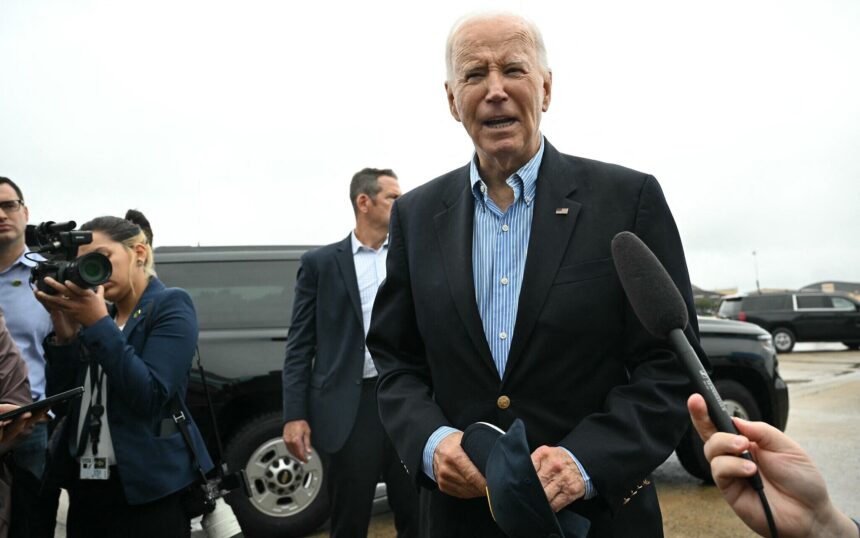In a significant statement, President Joe Biden has expressed his opposition to any Israeli military action against Iran’s nuclear facilities following a recent missile attack by Iran. This announcement comes in the wake of heightened tensions in the region, particularly after Iran launched approximately 180 missiles aimed at Israel, which were largely intercepted by Israeli defense systems. The current geopolitical climate reflects a delicate balance, where military responses could escalate into broader conflict.
Detailed Expansion
During a press briefing on October 2, 2024, Biden firmly stated, “The answer is no,” when asked if he would support Israeli strikes on Iranian nuclear sites as a retaliatory measure. His comments highlight a nuanced stance amidst a complex geopolitical landscape, emphasizing the need for a proportionate response from Israel rather than a broad escalation of military actions. This response is not only about military strategy; it is also deeply rooted in the diplomatic relationships the U.S. maintains in the region.
Biden’s assertion comes after a series of events that have exacerbated tensions between Israel and Iran. Following missile attacks that resulted in the death of one Palestinian man in the West Bank and injuries to two Israelis, Israel’s military acknowledged that some of the missiles had struck airbases but deemed the impact ineffective. In retaliation, Israel had been contemplating strikes on Iranian nuclear facilities, which would be a significant escalation in the ongoing conflict.
Biden’s administration has consistently underscored the importance of diplomatic engagement over military confrontation. His remarks align with a broader U.S. strategy aimed at preventing any actions that could lead to a wider military conflict in the Middle East. The president’s call for a measured response resonates with ongoing discussions among G7 nations, which are exploring coordinated sanctions against Iran to address the missile attacks without triggering an all-out war.
The geopolitical landscape is further complicated by statements from Iranian officials. Iranian President Masoud Pezeshkian indicated that while Tehran is not seeking war, they will respond forcefully if provoked. This response signals Iran’s readiness to engage militarily if it feels threatened, heightening the stakes for both sides.

The Broader Context of U.S.-Israeli Relations
Biden’s opposition to Israeli strikes on Iranian nuclear sites reflects a pivotal moment in U.S.-Israeli relations. Historically, the U.S. has been one of Israel’s staunchest allies, offering unwavering support in times of conflict. However, the current administration appears to be advocating for restraint, recognizing the potential for escalatory dynamics that could destabilize the region.
The implications of Biden’s stance are significant. By discouraging military action against Iran, the U.S. aims to maintain a degree of control over the narrative and actions of its allies. The administration has emphasized the need for Israel to consider the long-term consequences of its military strategies, particularly in relation to its Arab neighbors and the ongoing conflict with Hamas.
Moreover, Biden’s comments highlight the complexities involved in U.S. foreign policy, where the balance of power is often influenced by a multitude of factors, including public opinion, domestic politics, and international relations. This delicate balancing act is evident in Biden’s approach to the Israeli-Palestinian conflict, where he has sought to promote peace while also supporting Israel’s right to self-defense.
Potential Consequences of Military Escalation
Should Israel decide to proceed with military strikes on Iranian nuclear facilities, the repercussions could be profound. A military strike could trigger retaliatory measures from Iran, potentially drawing in other regional players and escalating into a wider conflict. The ongoing war in Gaza has already complicated the situation, with Iran’s support for militant groups like Hamas further intertwining the conflicts.
Military analysts have warned that an Israeli strike on Iranian nuclear sites could provoke a multifaceted response not just from Iran but also from allied militias in the region, including Hezbollah and various groups in Iraq and Yemen. Such a response could include missile strikes against Israeli territory or attacks on U.S. military bases in the region, heightening tensions further.
A Diplomatic Approach
In light of these considerations, Biden’s rejection of Israeli strikes on Iranian nuclear sites emphasizes the need for diplomacy over military action. The U.S. has historically engaged in various diplomatic efforts to curb Iran’s nuclear ambitions, including the 2015 nuclear deal. Although that agreement has faced challenges, the U.S. continues to advocate for a diplomatic resolution to ensure regional stability.
Biden’s administration is reportedly in active discussions with Israeli officials to find a balanced approach to the situation. This involves coordinating military strategies while also pursuing diplomatic avenues that can mitigate the potential for conflict. The focus remains on preventing Iran from advancing its nuclear capabilities while maintaining peace in the region.

Conclusion
Biden’s rejection of potential Israeli strikes on Iranian nuclear sites underscores the delicate balance the U.S. seeks to maintain in the region. As tensions escalate, it is crucial for all parties involved to navigate these challenges carefully to prevent further conflict. The call for a proportional response highlights the administration’s commitment to diplomatic engagement, aiming to address security concerns without triggering a wider military confrontation.
The situation remains fluid, and as events unfold, it will be essential for the U.S. to play a proactive role in fostering dialogue and cooperation among regional stakeholders. The implications of these decisions will not only shape the future of U.S.-Israeli relations but also impact the broader stability of the Middle East.








